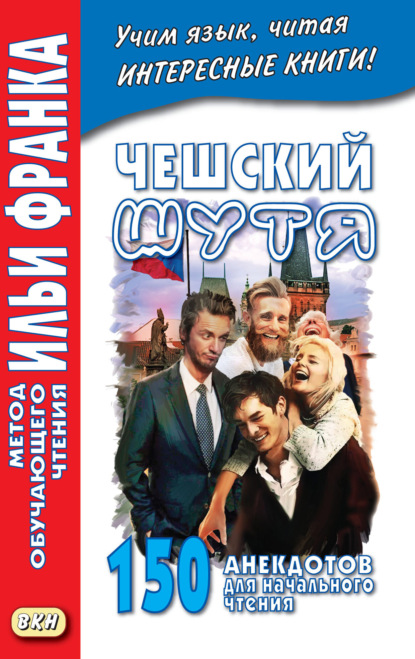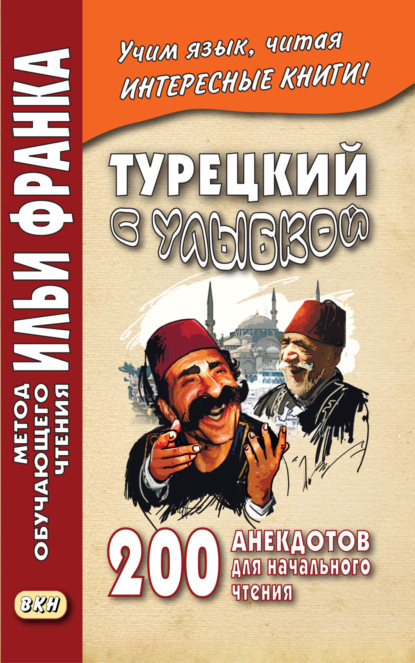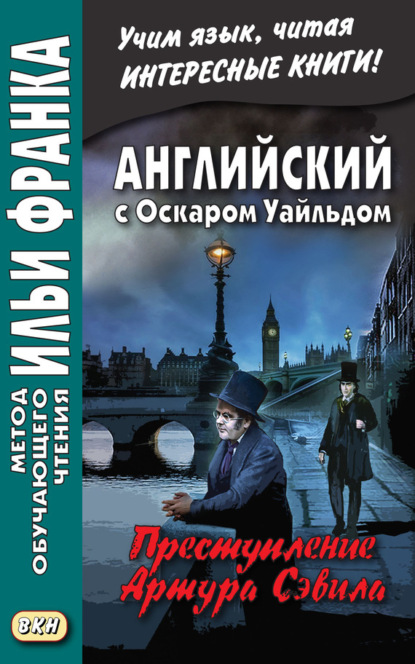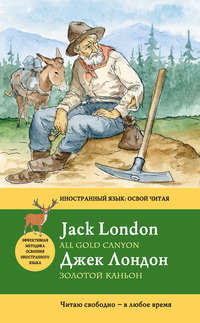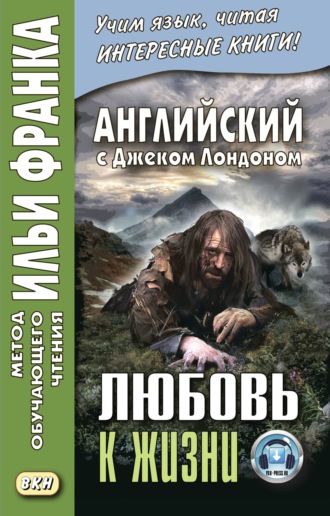
Полная версия
Английский с Джеком Лондоном. Любовь к жизни / Jack London. Love of Live
Thus he thought (так он подумал), and crumpled up and sank down upon the wet earth (/и/ упал духом и опустился на сырую землю; to crumple up – приходить в уныние, падать духом; to crumple = to crumple up – комкать, мять; приводить в беспорядок). At first he cried softly to himself (сначала он заплакал тихонько про себя), then he cried loudly to the pitiless desolation that ringed him around (затем он зарыдал в голос перед безжалостной пустыней, которая окружала его; to ring around – опоясать, окружать кольцом); and for a long time after he was shaken by great dry sobs (и долгое время после этого его сотрясали долгие сухие рыдания = долгие рыдания без слез: «он был сотрясаем…»; to shake – трясти, сотрясать).
He built a fire and warmed himself by drinking quarts of hot water (он развел костер и грелся, выпивая = поглощая кварты горячей воды; quart – кварта /единица измерения объема жидкости; равняется 1/4 галлона = 2 пинтам = 1,14 л в Англии; 0,95 л в Америке/), and made camp on a rocky ledge in the same fashion he had the night before (и устроил лагерь на скалистом выступе точно так же: «в такой же манере», как и предыдущей ночью; to make a camp – раскинуть лагерь). The last thing he did was to see that his matches were dry and to wind his watch (последним, что он сделал = напоследок он выяснил, что его спички сухие, и завел часы). The blankets were wet and clammy (одеяла были сырые и холодные; clammy – холодный и влажный на ощупь). His ankle pulsed with pain (его лодыжка пульсировала от боли). But he knew only that he was hungry (но он осознавал лишь, что он голоден), and through his restless sleep he dreamed of feasts and banquets (и на всем протяжении беспокойного сна ему снились пиршества и банкеты) and of food served and spread in all imaginable ways (и еда, которую подавали и раскладывали всеми вообразимыми способами; to serve – накрывать на стол, подавать; to spread – развертывать/ся/; расстилать/ся/; разносить/ся/, распространять/ся/; to imagine – воображать, представлять себе).
earth [ǝ:θ], quart [kwɔ:t], banquet [‘bæŋkwɪt], imaginable [ɪ’mæʤɪnǝbl]Thus he thought, and crumpled up and sank down upon the wet earth. At first he cried softly to himself, then he cried loudly to the pitiless desolation that ringed him around; and for a long time after he was shaken by great dry sobs.
He built a fire and warmed himself by drinking quarts of hot water, and made camp on a rocky ledge in the same fashion he had the night before. The last thing he did was to see that his matches were dry and to wind his watch. The blankets were wet and clammy. His ankle pulsed with pain. But he knew only that he was hungry, and through his restless sleep he dreamed of feasts and banquets and of food served and spread in all imaginable ways.
He awoke chilled and sick (он проснулся продрогший и больной). There was no sun (солнца не было). The gray of earth and sky had become deeper, more profound (серый цвет земли и неба стал темнее: «глубже», более насыщенным). A raw wind was blowing (дул промозглый ветер), and the first flurries of snow were whitening the hilltops (и первые снегопады покрывали белым вершины холмов; flurry – налетевший ливень или снегопад; to whiten – белить). The air about him thickened and grew white (воздух вокруг него сгустился и побелел) while he made a fire and boiled more water (пока он разводил костер и кипятил еще воду). It was wet snow (это был мокрый снег), half rain (наполовину дождь), and the flakes were large and soggy (и хлопья были крупными и мокрыми). At first they melted as soon as they came in contact with the earth (сначала они таяли, как только соприкасались с землей; to come in contact with – соприкоснуться с), but ever more fell (но /их/ падало все больше), covering the ground (/и они/ покрыли землю), putting out the fire (/и при этом/ затушили костер), spoiling his supply of moss-fuel (испортили его запас топлива из мха).
profound [prǝ’faʋnd], raw [rɔ:], half [hɑ:f]He awoke chilled and sick. There was no sun. The gray of earth and sky had become deeper, more profound. A raw wind was blowing, and the first flurries of snow were whitening the hilltops. The air about him thickened and grew white while he made a fire and boiled more water. It was wet snow, half rain, and the flakes were large and soggy. At first they melted as soon as they came in contact with the earth, but ever more fell, covering the ground, putting out the fire, spoiling his supply of moss-fuel.
This was a signal for him to strap on his pack and stumble onward (это был сигнал для него надевать тюк и ковылять дальше), he knew not where (он не знал куда). He was not concerned with the land of little sticks (его не интересовала ни земля «прутиков»; concerned – заинтересованный; увлеченный; озабоченный, беспокоящийся), nor with Bill and the cache under the upturned canoe by the river Dease (ни Билл и тайник под перевернутым каноэ у реки Диз). He was mastered by the verb “to eat (он был управляем глаголом «есть»; to master – овладевать; руководить, управлять).” He was hunger-mad (он обезумел от голода). He took no heed of the course he pursued (он не обращал внимания на курс, которым он следовал; to take no heed of – не обращать внимания на), so long as that course led him through the swale bottoms (при условии, что этот курс вел его через болотистые низины). He felt his way through the wet snow to the watery muskeg berries (он пробирался ощупью сквозь мокрый снег к водянистым болотным ягодам), and went by feel as he pulled up the rush-grass by the roots (и шел наощупь, вырывая тростниковую траву за корешки). But it was tasteless stuff and did not satisfy (но она была безвкусной дрянью и не утоляла голод; to satisfy – удовлетворять; радовать, доставлять удовлетворение; утолять /голод, любопытство и т. п./; taste – вкус; stuff – материя /особ. шерстяная/, ткань; материал, вещество; дрянь, хлам, чепуха). He found a weed that tasted sour (он нашел водоросль, которая была кислой на вкус; to taste – иметь вкус, привкус) and he ate all he could find of it (и он съел ее всю, что смог найти), which was not much (чего = а ее было немного), for it was a creeping growth (ибо это было вьющееся растение; growth – плод, продукт; урожай; нарост; предмет выращивания; растительный покров), easily hidden under the several inches of snow (легко прячущееся под несколькими дюймами снега; hidden – спрятанный; to hide – прятать).
concerned [kǝn’sǝ:nd], course [kɔ:s], taste [teɪst], sour [‘saʋǝ]This was a signal for him to strap on his pack and stumble onward, he knew not where. He was not concerned with the land of little sticks, nor with Bill and the cache under the upturned canoe by the river Dease. He was mastered by the verb “to eat.” He was hunger-mad. He took no heed of the course he pursued, so long as that course led him through the swale bottoms. He felt his way through the wet snow to the watery muskeg berries, and went by feel as he pulled up the rush-grass by the roots. But it was tasteless stuff and did not satisfy. He found a weed that tasted sour and he ate all he could find of it, which was not much, for it was a creeping growth, easily hidden under the several inches of snow.
Конец ознакомительного фрагмента.
Текст предоставлен ООО «ЛитРес».
Прочитайте эту книгу целиком, купив полную легальную версию на ЛитРес.
Безопасно оплатить книгу можно банковской картой Visa, MasterCard, Maestro, со счета мобильного телефона, с платежного терминала, в салоне МТС или Связной, через PayPal, WebMoney, Яндекс.Деньги, QIWI Кошелек, бонусными картами или другим удобным Вам способом.
Примечания
1
Рассказ адаптировал Олег Дьяконов.
2
To toss – метать, швырять, кидать; держать пари, делать ставку.
3
Медный рудник.


